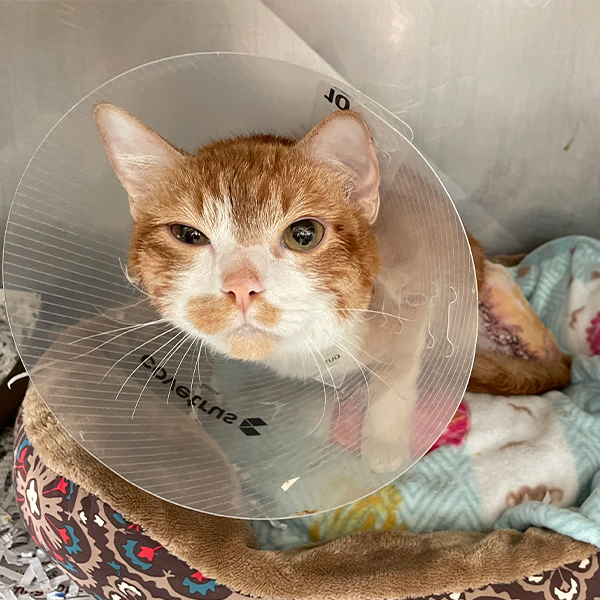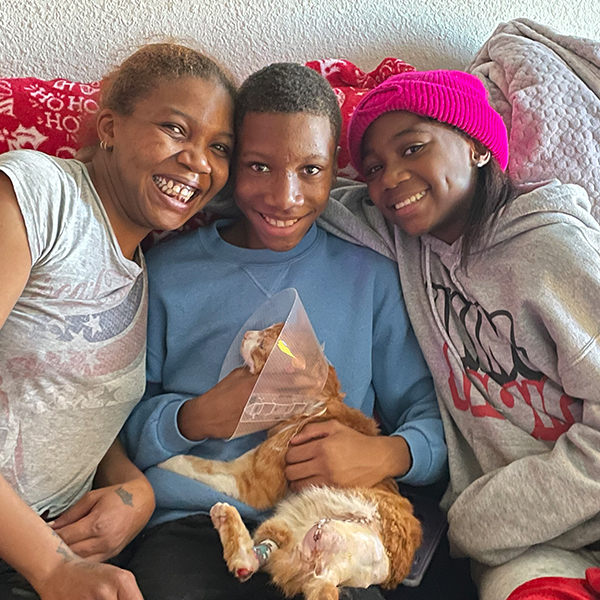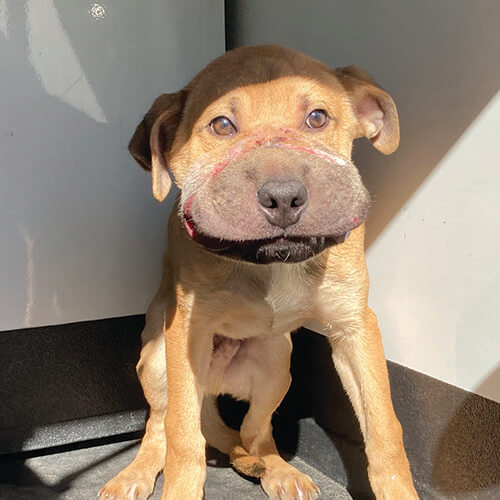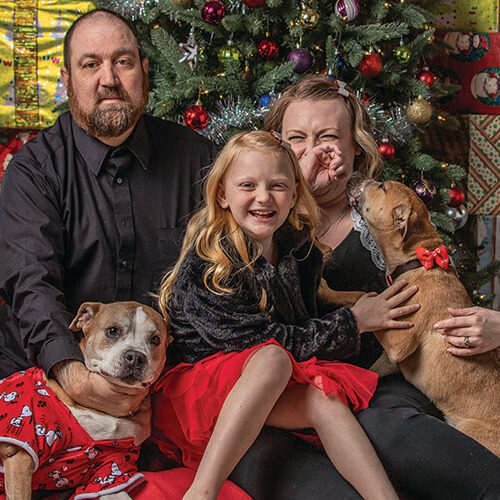
In Washoe County, pet license fees and donations are an important source for funding essential animal services. When you license your pet, know that you are doing your part to help your local shelter workers care for lost, injured and abused animals.
By The Numbers
11,000
Animals sheltered
per year
3,000
Lost pets
reunited
43
Employees
Q&A
Talkin' Shop
Here’s what’s been happening at Washoe County Regional Animal Services.
What is something you are really proud of as an organization? Our efforts to reunite animals is one that is recognized within our industry. We utilize tools in the field to actively reunite lost animals prior to bringing them to the shelter. We also work very hard to reunite an animal if it is brought into our shelter through contacts and follow-up communications to the owners of the animals if we have it in our possession.
What makes your organization unique? Our government/nonprofit partnership with Nevada Humane Society is a unique one that few animal control operations share. It enables our two entities to shift our focus to programs that best fit our mission without duplication of resources.
What is a program that you run that is important for people to know about? Our free microchip program is the single most important tool that we offer to help keep pets and their people together.
Can you share a story of a specific pet you’ve helped?
Waffles
3-year-old Waffles came to us as a stray on December 18th, noticeably skinny with an injury to his back leg. As soon as staff saw the cat, he was immediately taken to an emergency vet for stabilization. The owner saw him on our lost and found website and immediately called WCRAS. They then quickly met our ACO at the emergency vet for Waffles. The family had been frantically searching for Waffles for almost three weeks, submitting multiple lost reports to WCRAS and checking their neighborhood for him. Unfortunately, Waffles’ injuries would require immediate and expensive treatment, which the family was unable to afford at the time. On December 23rd, they made the heart-wrenching decision to sign Waffles over the WCRAS to be humanely put to sleep to stop his suffering.
In a request from our ACO that day: “The family (Mom and two kids) was absolutely devastated to sign over ownership of their cat to be put to sleep. The cat is normally indoor-only but managed to sneak out a little more than two weeks ago, resulting in the injuries. We did not mention the chance of rescue because we didn’t want to get their hopes up. It would be great if we could save this young, friendly cat. It would be even better if we could find a way to handle the vet care and then get him back to his owners. The only reason they signed him over was because they knew they couldn’t handle the vet situation fast enough, not that they were unwilling to try.
With the holidays fast approaching and many phone calls to partner organizations for help, we were able to find a vet willing to take him in that same day and all costs were covered by the WCRAS CARES Program and the SPCA Todd’s Medical Fund. His leg was amputated, and our ACO had the opportunity to call and tell the family that Waffles was coming home. He will learn to live as a tripod, but we believe he has enough spirit to do it. On December 24th, our staff returned Waffles to his family just in time for the holidays. The family was overjoyed at his return.


Bowie
A single, anonymous phone call made all the difference for this puppy and likely saved his life. Animal Services field staff quickly responded to the call to check on a puppy with his mouth tied shut inside a wire crate in a backyard. These types of calls are just one of many that Animal Control Officers investigate. Officers routinely photograph and collect evidence, interview witnesses, prepare case reports and testify in court as part of their complex responsibilities. Sometimes, cases can take several months to years to resolve. In many cases, the animals are required to be cared for at Animal Services for lengthy periods until criminal proceedings have been concluded.
This sweet and trusting puppy, now named Bowie, suffered cruelty from his former owner. His mouth was tied shut by a tightly tied lace for an unknown period of time. Bowie was rescued from this situation by the officer. He was provided emergency medical care and a lot of TLC while at Animal Services. His face swelled up so large after the lace was removed that he was required to be hand fed for a few days. After he was stabilized, he was transferred to the Nevada Humane Society, where he was placed into a foster home to be carefully monitored. He was later adopted out to an incredible and loving family. His former owner has been formally charged- all because of a single anonymous phone call.


In your words, why are pet licenses important? Pet licensing is important to help promote proof of ownership of an animal. It serves as identification if the pet is ever separated, and licensing accompanies a current rabies vaccination, which helps to protect our animal and human community members. Lastly, licensing fees help support all of the critical, signature services the department offers our community.
If someone wants to donate pet supplies, what are the items that are needed most?
- Community pet supply programs - Leashes, Collars, Fleece blankets, Cat food (wet and dry)
- In shelter care and enrichment - Fleece Blankets, XL kongs, cat toys.
To what extent do pet license fees contribute to your overall budget? Revenue from licensing fees represents a small amount of our overall budget. In any given year, licensing revenue makes up 5.25% of our annual budget.
What does the day of a shelter worker/volunteer normally look like? Daily tasks vary widely depending on which area of the shelter a staff member works.
For Field staff members, they staff every day (including holidays) from 8 am - 10 pm. Our dispatchers take calls from the public and our partner agencies for stray animals, deceased animals, welfare concerns, and neglect concerns. The dispatchers document the calls in our system and then assign a field officer based on the priority of the call, the location of the officers in the area, and number of calls any one officer has been assigned. Our officers spend much of their time out in the field, driving their trucks to and from calls, picking up stray pets, addressing welfare concerns, confiscating pets in necessary situations, issuing citations, addressing pets left in hot vehicles, and performing inspections for variance permits, commercial permits, exotic animal permits, and dangerous dog permit holders. Officers also often attend court dates to testify in cases of animal neglect, cruelty, or dangerous dog determinations.
Our kennel staff provides animal intake for each pet that is brought to the shelter. Ensuring the pets are vaccinated, healthy or receiving proper treatment, have food and water, that their kennels are routinely cleaned, and that animals receive enrichment through walks, playtime, or other enrichment activities. In addition, they monitor all pets for signs of illness or injuries, microchip pets that the public brings in for a free microchip, bring reclaimed animals out to their families, work with more than 20 local, regional, and national rescue groups to work with unclaimed pets and find them a new forever home. Kennel staff maintain a wide array of skills and knowledge on animal care. With 117 dog kennels, 16 puppy cages, 160 cat condos, a six-stall barn for livestock and dedicated rooms for reptiles and small animals, kennel staff members may work with cats, dogs, pigs, goats, horses, kittens, puppies, lizards, snakes turtles, tortoises, bunnies, gerbils, guinea pigs, pet rats, chickens, roosters, peacocks, monkeys and many other species of animals on any given day.
Our administrative staff perform the day-to-day operations of the facility, including managing public inquiries, record requests, permit applications, inspection scheduling, data tracking, public outreach events such as vaccination clinics, veterinary bill support, supply and pet food distribution, free microchipping program, social media, data tracking and statistics and long and short term program planning. In addition, the staff members who regularly work at the front desk will also handle updating client information, providing pet licensing, updating vaccination information, reviewing lost and found pet reports, intake of pets brought in by the public, creation of custom pet tags and IDs, referring the public to local resources, and so much more.
What should people know before adopting a pet? Do your research about the type of animal or breed you are considering adopting to make sure it is a good fit for your family. Activity level, yard size, and family needs could all be potential factors to consider, and we want adoption to be a lifelong commitment for the animal.
What is your best advice for pet owners? Support pet adoption, fostering, donation or volunteerism. Your shelter needs community support to be successful.
What is an easy way for community members to help support your organization? WCRAS needs our community to stay engaged with our efforts, follow us on social media, and sign up for our newsletters. Tell a friend or a family member about the great work being done each day to keep pets safe in our community.
For more information about Washoe County Regional Animal Services, visit
www.washoecounty.gov/animal